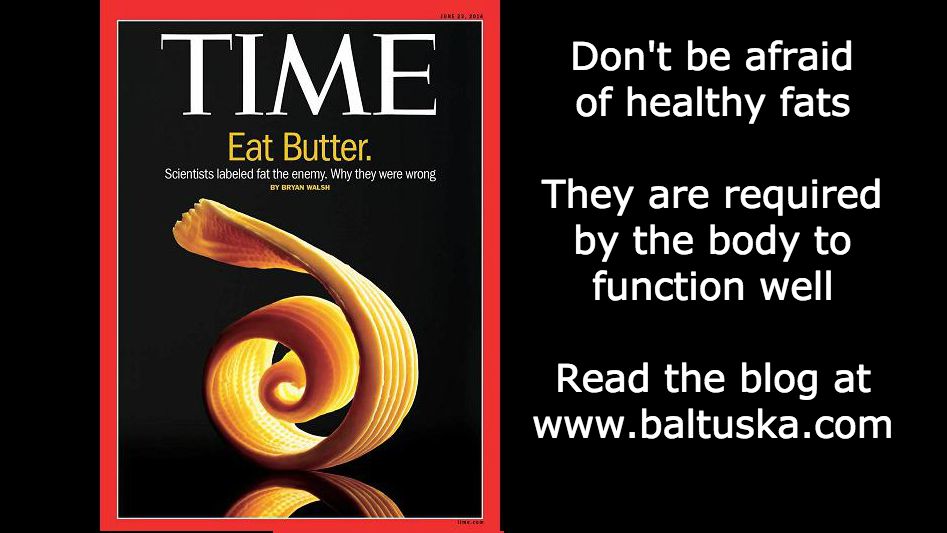Get fat! The truth about fatty food and nutrition.
 One of the most detrimental misconceptions over the past 40 years is that “fatty foods are unhealthy”. All types of advertising, food labels, and even licensed nutritionists have been recommending foods that are “fat free” or “low fat” and attribute the fat in our diets with poor cholesterol levels, heart disease, and obesity. Only in the past decade have the mainstream health advocates begun to reveal the truth about fat. Research is pouring in about our body’s requirement for fat in order to function properly.
One of the most detrimental misconceptions over the past 40 years is that “fatty foods are unhealthy”. All types of advertising, food labels, and even licensed nutritionists have been recommending foods that are “fat free” or “low fat” and attribute the fat in our diets with poor cholesterol levels, heart disease, and obesity. Only in the past decade have the mainstream health advocates begun to reveal the truth about fat. Research is pouring in about our body’s requirement for fat in order to function properly.
The truth is, fats provide the building blocks for your cell membranes and a variety of hormones and hormone-like substances. Fats also serve as carriers for the vitamins A, D, E, and K and are required for converting carotene into vitamin A, absorbing minerals, and a variety of other important biological processes. Saturated fat is actually the preferred fuel for your heart. Imagine the consequences of denying your body this essential nutrient!
Good sources of healthy fats to add to your diet include:
• Avocado
• coconut oil
• nuts and seeds
• raw dairy
• real butter made from raw grass-fed organic milk
• organic pastured egg yolks
• grass-fed meats
If you have been avoiding fats for a long time, you may have developed a “sweet tooth” and often crave sugar, soda pop and other soft drinks, candy, fruits, pastries and cakes. This feeling is likely your body signaling to you that you have not been eating enough fat. Many times my patients are able to help remedy their sugar addiction by introducing healthy fats back into their diet.
(While on the topic of sugar addiction it is also important to regularly
consume probiotics and avoid wheat products.)
Types of fats:
Saturated fats: Saturated fats are found in animal products such as butter, cheese, whole milk, cream, ice cream, and fatty meats. They are also found in some tropical plants and vegetable oils such as coconut, palm and palm kernel. (See the list above for my favorite saturated fats in foods.)
Monounsaturated fats: Most commonly from Olive and Canola oil. Olive oil is considered the healthier oil because of the nutrients it contains. Extra virgin olive oil contains antioxidants, polyphenols and omega-3 fatty acids with can promote cardiovascular health and cognitive function as well as boosting your immune system and protecting you from many types of cancer and even prevent or reverse type 2 diabetes. Olive oil even has anti-inflammatory properties, and can be of immense benefit to those with inflammatory diseases like arthritis and osteoporosis. In a speech by one of KC’s best preventative cardiologists, James O’keefe, MD, he said “my family goes through olive oil like your family goes through milk”.
Trans fats: Avoid at all costs! These fats form when vegetable oil hardens; a process called hydrogenation, and can raise LDL (bad cholesterol) levels, and lower HDL (good cholesterol) levels, which of course is the complete opposite of what you need in order to maintain good heart health. In fact, trans fats — as opposed to saturated fats — have been linked repeatedly to heart disease. These fatty acids can also cause major clogging of your arteries, type 2 diabetes and other serious health problems. Be warned! The discovery of the serious health consequences of consuming trans fats has led to the requirements to label it on food sold in stores and restaurants. One loop hole that food companies have found is that if the serving size is small enough, then they don’t have to label “trans fat” on the product. This stinks because we end up doing the same damage by consuming multiple servings of the smaller product. Another name for trans fats to avoid on the food label is “partially hydrogenated vegetable oil”.
Most people poison themselves with trans fats by eating fast food, snack food, fried food, and baked goods. The food industry uses trans fats in these foods for many reasons like increasing product shelf life, decreasing refrigeration requirements and replacing animal fats at lower cost.
(Another important topic in nutrition of fats is the
omega-6 fatty acid to the omega-3 fatty acid ratio.)
Don’t be scared of fat anymore. We had it all wrong and many have suffered because of the misinformation.
Kelly Baltuska, DC

 It is easy to go back and forth with the dangers vs. the benefits of coffee consumption. By sticking to a few key practices, you can be sure that you are avoiding the dangers while reaping the benefits. As with many things, moderation is important. Always avoid more than 3 cups in a day.
It is easy to go back and forth with the dangers vs. the benefits of coffee consumption. By sticking to a few key practices, you can be sure that you are avoiding the dangers while reaping the benefits. As with many things, moderation is important. Always avoid more than 3 cups in a day.